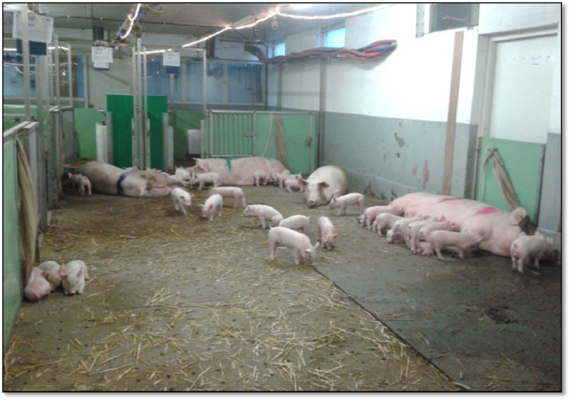©VIC Sterksel
It has been mandatory since 2013 to keep pregnant sows in group housing because that lets them exhibit their natural social behaviour. But to give birth, the sows are placed in farrowing pens that are too small for them to turn in. This is to prevent them from rolling onto the piglets and crushing them to death. After the birth, the sow and her piglets spend about four weeks in that pen, after which the piglets are weaned (separated from the sow). That often causes a lot of stress. They have to switch to solid feed and are transferred to new surroundings with unknown piglets. As a result they don’t eat so well and run a greater risk of becoming ill or engaging in tail biting.
Food
Van Nieuwamerongen investigated the welfare of the piglets if you keep five sows together with their pigs in group nursery pens. She discovered that this has benefits. The piglets learn about eating solid feed from their mother from an early age. In addition, the piglets grow up together in a more spacious environment with play materials such as straw and jute sacks, and they stay together after weaning. Van Nieuwamerongen established that these piglets ate more, grew better and had fewer problems with diarrhoea. The animals also played more and were less likely to damage one another’s ears or tails.
Gradual
Those benefits increase if you make the separation of the piglets from the sow a gradual process. In this gradual weaning process, the sows were able to isolate themselves from the piglets in a separate area between four and nine weeks after giving birth.
Mortality
Yet the group housing also has a downside. Piglet deaths were higher because they were more likely to be laid upon by the mother, especially in the first week. Van Nieuwamerongen thinks this problem can be resolved by improving the design of the farrowing pen. Pig farmers could also choose the kind of sow that takes better care.
The PhD candidate can’t say whether the group system is a financially better choice. It is more expensive because the animals take up more space, but the meat may fetch a better price if it gets two or three stars on the Beter Leven animal welfare label.
Sofie van Nieuwamerongen will graduate 19 May from Bas Kemp, professor of Adaptation fysiology

